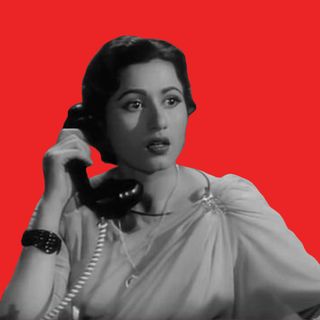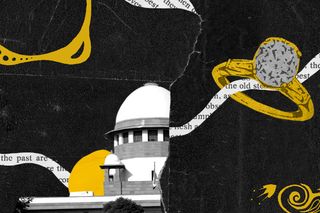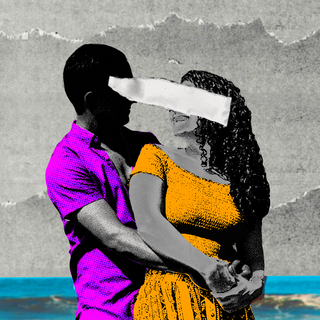
Same‑Sex Marriage Isn’t the Revolution We Asked For
Revisiting the forgotten text, ‘The F*ggots and Their Friends Between Revolutions,’ ahead of the Supreme Court verdict on marriage equality.

In ‘Manifesto This,’ we dialogue with a radical text to dream of a better world. This month, ahead of the Supreme Court’s verdict on the marriage equality petitions, we engage with Larry Mitchell’s fable-manifesto that underscores the value of love and community in queerness over any regulatory apparatus: ‘The Faggots and Their Friends Between Revolutions.’
I. “It’s been a long time since the last revolutions and the faggots and their friends are still not free.”
Supposedly, the current revolution is taking place in the highest court of the land. As we speak, the court has retreated into holiday. It will deliberate the outcome of the revolution, and then the revolution will be civil. Marriage has always been civil.
India’s fight for marriage equality makes for a good mythical story. It remains out of reach for the hand grasping for another illicit hand in the back of a taxi, out of view of the rearview mirror. This blindspot to the rest of the world is a liminal space marriage can never secure.
The crux of the petitions are rights and benefits. These include inheritance, insurance, property ownership, succession, perhaps even adoption. They’re a “bouquet” of rights, as petitioner Menaka Guruswamy called it, ensuring equal access to the property regime, which is the promise of marriage. These are rights to be sure, and somehow the great promise of marriage is the latitude to announce our joint prerogative over stuff. A house is a house is a house. Neither the Supreme Court, nor the executive, nor any governing body in the world, can say for sure what home, on the other hand, might be.
Still, marriage equality is a notion based on the premise that rights are where desire exists. But some of us desire in negatives: the desire to escape scrutiny. But there is no fundamental right to be free from the fear of other people. Shame is a cross some of us carry anyway, even if we can make the down payment on a 3BHK together, with both our names on the papers. We may be able to pledge our fealty to the state, an unnatural couple granted permission to exist next to the natural ones. It will be legal if all goes well, but is it freeing?
II. “The first revolutions destroyed the great cultures of the women. Once the men triumphed, all that was other from them was considered inferior and therefore worthy only of abuse and contempt and extinction.”
Marriage before this ongoing revolution, wherever it may lead us, left us few options. Really, only one path ahead for some of us – the self-actualization of women into motherhood. And as Andrea Dowrkin said in Right Wing Women, the existence of homosexuality threatens some women, because it imagines a world without procreation using mothers. No mothers, no women. Or so it goes.
Feminist scholars pointed this out for a long time: Women have always been wombs for the family name – in the male line – to survive across generations. Marriage has treated us as incubators of legacy. The seminal idea of marriage: planting the seed. Women without wombs it dismisses as not women at all.
No matter what we tell ourselves, its function in using (wombed) women to preserve a name means that marriage can’t accommodate desire that isn’t procreative. A marriage can never rest on the joy of a stolen kiss in a strange place, rid of familiar faces that recognize you; it’s never a possibility for joy’s own sake. Marriage is functional, productive. Love is not. If marriage recognizes love, but if two individuals kiss outside the gaze of the state, will they have kissed at all?
As Yasmin Nair put it: “the fight for gay marriage, in granting that institution so much importance, is slowly eroding the possibility that the rest of the population might get rights and benefits without marrying each other.”
It’s also eroding the possibility of the things that aren’t rights at all but that make this life easier.
III. “The faggots’ fantasies create play—dressing up and dressing down.
The men’s fantasies create responsibilities—going here and doing that.
The faggots’ fantasies are about love and sex and solidarity.
The men’s fantasies are about control and domination and winning.”
Marriage regulates play. The teams are predetermined – jati against jati. Zero sum games have only one of two endings – both whole, rational, and neat. The squishiness in an inter-faith, inter-caste union is unpleasant even for the state that generously allows it. In the Special Marriage Act, a 30-day notice period allows families to sink their tenterhooks back into errant fish that breathlessly strayed too far ahead in their fantasies. More, different couples can enjoy the pleasure of this timed fantasy too, if the revolution comes to pass.
And that’s not to speak of the wedding. The pièce de résistance, the bride, with the family bank account writ large on her body. Being and performing the role of the bride is money in drag. A whole family’s standing is represented in the ornaments that shackle her. The guests size her up. She is the centerpiece. Soon, the NCRB reminds us, more than 7,000 — as of 2022 — of these will die mysteriously; spilt milk for an unproductive patrilineal arrangement. They’re called “dowry deaths” – as if dowries are a modern anomaly and not the valuation constantly made of the brides teetering on the edge of potential violence.
Game over. Marriage plays ball, but only by the rules of the men who wish to own women. Adding newer participants slots them into pre-existing roles. Marriage is the gender binary – “same sex” partners will be reassigned, resexed, and correspondingly masculinized or feminized by the state. This marriage – the democratization of dowry-givers – means lesser play for the sake of play.
IV. “The faggots find it hard to be near the men. The faggots know that you choose to either obey the programs or to defy the programs. They find it troublesome to be around those who say the program is inevitable”
Why marriage, we might ask. But what else, they respond. This revolution, if it comes to pass, will be televised. It will be advertised. It will be corporatized. It will be optimized for Instagram proportions. The revolution will favor those who can take it home. The revolution’s victors will be the ones whose natal families give them a hero’s welcome. The revolution’s history will be written by the ones who believe there is an outside and an inside pertaining to the mythical closet – not by the ones for whom the closet, or visibility, is irrelevant to their love. The latter may never come out, marriage notwithstanding, because coming out presumes there is space to occupy outside. For many, it’s a space laden with minefields. For many, it’s also a space laden with the burden of being seen. Love, for all its grandiosity, is its most intimate when unseen.
In a society that legislates where it should go and who should receive it from whom, love is most declarative when it’s none of anybody’s business. And besides, sexuality notwithstanding, marriage was never not an option. It’s coming for all of us – to deny it is to outcast ourselves. The marriage that’s promised now, dangled before us on Lady Justice figurines at the courts, asks that we state our desires once and for all with no room for fluidity – will we choose to be lawfully wedded outcasts, lawfully wedded outcastes, or all of the above? The more they try to include inside marriage, the less space to run.
V. “The faggots and their friends and the women who love women know that for a while they can find some safety in the confusion they can create. They have some time to develop their resources to survive.”
It was never our revolution anyway – not for all of us. In this exercise to assimilate enemies of the state – those it still clearly sees as abnormal, “Western,” weak, wrong – respectability is the noose. In the meantime, what does divestment from all of it – marriage, respect, the men in the courts defining these terms – mean? Chaos, confusion, and disagreement over what we want. Before the discursive tide turns to painting the ability to own property and insurance together as “love” winning, we’ll need to figure out what love even means. What we do know is that love isn’t merely the right to do, say, give, or take things together. Love exists in things that cannot be legislated: community, friendship, solidarity, intimacy, the tenderness across friends, lovers, families, and everyone in-between. But with the state demarcating them through marriage, love is empty plots of land. Love is plastering a rubber-stamped paper over that plot of land. It’s the wherewithal to share the land without owning it that brings love to this revolution.
Rohitha Naraharisetty is a Senior Associate Editor at The Swaddle. She writes about the intersection of gender, caste, social movements, and pop culture. She can be found on Instagram at @rohitha_97 or on Twitter at @romimacaronii.
Related


Teaching Like a Savarna
